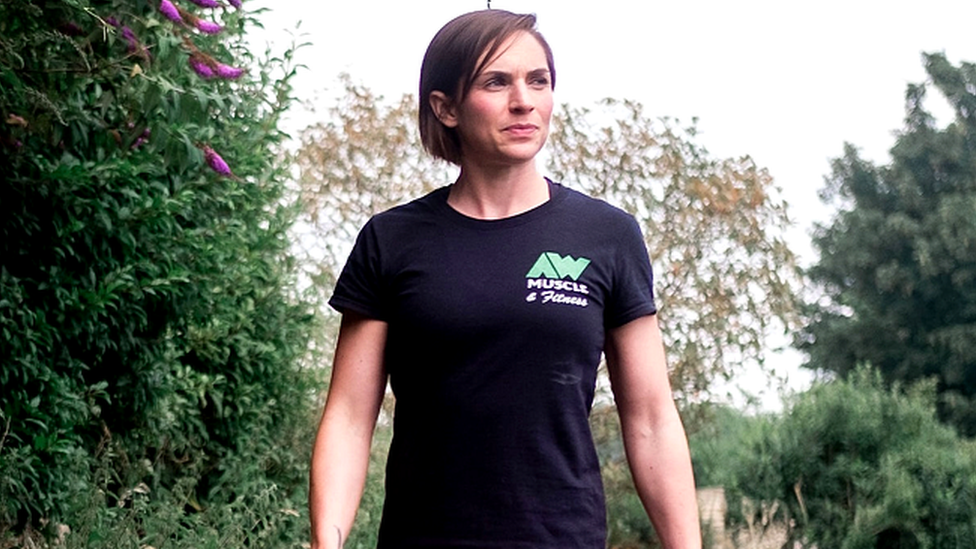Kids told to wear extra layers to cut energy bills
- Published

A nursery is telling children and staff they will have to wear more clothes to help cut heating costs as businesses struggle with soaring energy bills.
"We can't afford to have the heating on all day because it will ruin us," DaisyChain owner Lee-Anne Lovegrove told the BBC.
The British Chamber of Commerce has called on the government for Covid-style emergency grants to help firms.
Unlike many households, there is no price cap on commercial energy bills.
It leaves many smaller firms at risk as they try to cope with the rocketing cost of heating and lighting their premises.
And in fresh woes for small businesses, wholesale gas prices have climbed to their highest level in five months.
On Thursday prices for delivery to UK suppliers jumped 82p to 580p per therm because of uncertainty about Russian and European gas supplies ahead of planned maintenance next month.
"We've had no support here from the government at all," said Ms Lovegrove.

DaisyChain nursery owner Lee-Anne Lovegrove says having the heating on all the time 'will ruin us'
"We will provide the heating for the children, we will just ask parents to put an extra layer in the children's bags so we don't need to have the heating on for the entire day."
She said that as the weather gets colder DaisyChain nursery in Weston-super-Mare will warm the building before children arrive but then only put it on for 10 to 20 minutes every hour to keep it at an ambient 20 degrees, rather than the usual 21 or 22 degrees.
"We have 12 members of staff here and I've asked them to ensure they wear more layers when they come to work because we won't be able to have the heating on from 8 o'clock to 6 o'clock every day because financially it's going to ruin us.
The BCC said action must be taken quickly to "protect businesses, livelihoods and jobs". The business lobby group has a five-point to help firms including a temporary cut in VAT to 5% as well as introducing emergency grants for small and medium-sized companies.
Many businesses are set to renegotiate their electricity and gas prices in October. Some firms will face bills five times their current price when energy contracts are renegotiated, analysts at Cornwall Insight have warned.
"Good business is good for our communities, and we must support firms and the individuals that run them to ride out this economic storm," said Shevaun Haviland, director general of the BCC.
As part of its five-point plan, the BCC has called for a rise in National Insurance contributions to be reversed to hand more funds back to firms and workers.
It also said the government should review and reform the Shortage Occupation List to help fill staff vacancies and bring down wage pressures.
Soaring energy costs are pushing cafes, restaurants and shops across the nation to the brink, the Federation of Small Businesses has warned.
'We're accumulating debts'
Sayd Ahmed, owner of Pappadoms restaurant in Weston-super-Mare said he's had to re-mortgage the family home to keep his business going.
He said that the restaurant's heating bills were around £600-£700 a month last winter but in June - even when the weather was warmer - the cost hit £1,700.

Sayd Ahmed, owner of Pappadoms restaurant, said he has had to re-mortgage his home
Electricity bills have also climbed from £350-£400 to £700 a month.
"We can't really afford it and we're accumulating debts with suppliers," said Mr Ahmed. "As a business we should be making money, not losing money and not re-mortgaging our house to keep our business afloat."
The whole family is counting the cost, he said: "It's a family-run business with my two daughters and son working here and we haven't taken any wages since January."
Almost 15% of small-and-medium sized firms believe they may have to close or downsize as a direct result of the spiralling energy costs, according to FSB figures.
'Getting worse'
Emily Wilkinson, who runs AW Muscle and Fitness in Cheshire with her husband, said their electricity bills have more than doubled from around £480 a month last September to over £1,000 when they fixed for another year.
"That'll go up again this year and could be rising to £18,000 a year, which will be up from about £6,000," she said.
Cornwall Insight said: "Those who negotiated two-year fixed price contracts in summer 2020, are potentially facing a substantial fivefold rise in October, with those renewing an annual contract due to see bills twice what they paid this year."

Emily Wilkinson says energy costs at her gym are rising
Ms Wilkinson said "We have to run equipment, we have to play music. We open at 6am and if you look outside now it's dark, so we're going to have to have the lighting on more.
"By the time we shut in the evening it's dark again so it's only going to get worse over the coming months."
Chris Weston, who owns Weston's bakery in Sudbury, Suffolk told the BBC the government has "to do something because in the end they are not going to have any small businesses left".
She is facing a 33% increase in her electricity bill, which works out at around an extra £1,000 a month.
A government spokesperson said: "We understand that people are struggling with rising prices, and while we can't shield everyone from the global challenges we face, we're supporting British businesses to navigate the months ahead.
"We've cut taxes for hundreds of thousands of businesses by increasing the Employment Allowance and slashing fuel duty. We've also introduced a 50% business rates relief for retail, hospitality and leisure businesses and put the brakes on bill increases by freezing the business rates multiplier, worth £4.6bn over the next five years."
"We must ensure companies with heritage, roots in their communities and otherwise good prospects are not washed away," said Robert Buckley, head of relationship development at Cornwall Insight.
"Such an outcome would have consequential impacts on real people and families not just company balance sheets and GDP statistics."
Related topics
- Published25 August 2022

- Published22 September 2022
